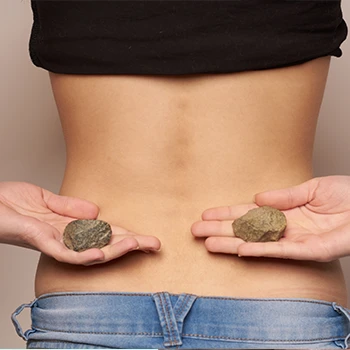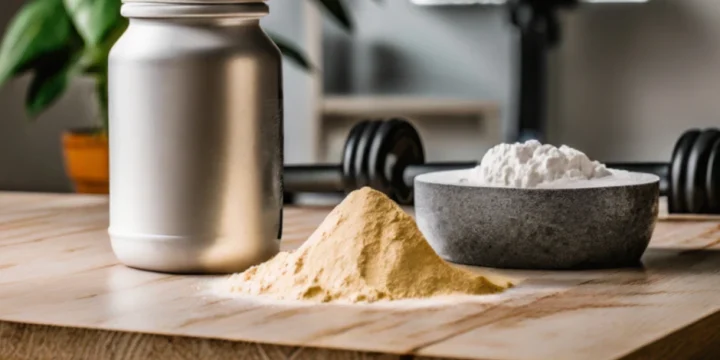Throughout my career as a pathologist, I've observed many patients who are gym-goers regularly using pre-workout supplements.
The concern about these supplements leading to kidney stones is a topic I've encountered frequently in both professional and fitness circles.
Driven by both professional curiosity and personal interest, I dedicated substantial time to researching this topic.
So, can pre-workout cause kidney stones?
Continue reading for my insights.
Quick Summary
What Does the Research Say About Pre-workout and Kidney Stones?

A 2017 study in the Journal of the International Society of Sports Nutrition indicates that pre-workout supplements are generally safe and unlikely to cause kidney stones in healthy individuals without pre-existing kidney conditions [1].
However, caution is advised due to findings, such as those presented at the Endocrine Society's annual meeting, showing elevated blood and urine calcium levels in individuals supplementing with vitamin C, vitamin D, and calcium [2].
These components, occasionally found in pre-workout formulas, necessitate careful consideration and consultation with your healthcare professional.
“The use of calcium and vitamin D supplementation may not be as benign as previously thought”
- J. Christopher Gallagher, M.D., Principal Investigator
Additionally, creatine, a frequent ingredient in pre-workout supplements, has been scrutinized for potential renal issues. While studies generally do not associate creatine with kidney problems in healthy individuals, they recommend against its use in those with existing kidney conditions [3].
Therefore, individuals with kidney concerns should consult healthcare professionals before using such supplements.
Encouragingly, recent research is directed towards creating specialized pre-workout products for those with kidney issues. These formulations aim to offer safe and effective support for fitness objectives without compromising kidney health.
Prevention Tactics

From my professional experience in pathology, I've seen numerous cases of kidney stones and understand the severe pain they cause.
According to the Mayo Clinic, a kidney stone flare-up comes with several intense symptoms, including severe, sharp pain in the back or side, a burning feeling when urinating, frequent urination, fever and chills, bloody urine, nausea, vomiting, and cloudy or odorous urine [4].
Drawing from both my extensive academic background in medicine and firsthand observations in the lab, I've identified six key strategies to prevent kidney stones, which I often share with my colleagues and those I advise in fitness and health matters:
- Drink water. Avoiding dehydration is one of the best preventative measures you can take. The standard advice is to drink 2-3 quarts or 8–12 cups of liquid per day and to avoid sugary drinks like soda and juices [5].
- Drink coffee. Besides its many health benefits, coffee seems to reduce the formation of “stones” in the kidneys [6].
- Avoid high-oxalate foods. Reduce intake of oxalate, a naturally occurring chemical in foods like rhubarb, spinach, some berries, chocolate, beets, wheat bran, and some nuts, as calcium oxalate is the most common type of kidney stone.
- Control your protein intake. A high amount of animal protein can contribute to the problem. Eating animal protein like eggs, beef, fish, poultry, and cheese can offer other health benefits; keep the amount moderate.
- Reduce salt. High sodium (salt) means more calcium in your urine, increasing the likelihood of a kidney stone outbreak.
- Manage your weight. Being overweight contributes to many health conditions, including kidney stones. Some pre-workout supplements might help you with weight loss.
The Type of Pre-workout You Choose Matters

According to a study by the Journal of the International Society of Sports Nutrition, pre-workout supplements can significantly improve exercise performance, including increased endurance and focus during workouts [7].
I advise patients and fitness enthusiasts to meticulously read ingredient labels and adhere strictly to the manufacturer’s dosing guidelines to maximize the benefits and minimize the risks of these supplements.
Here are some useful tips:
- Avoid proprietary blends; these conceal just what ingredients and amounts are in the supplement; you need to know what you are putting in your body.
- Avoid artificial sweeteners; consuming them offers no added health benefit [8].
- Avoid supplements with complicated chemical substances used as additives and fillers.
The takeaway is to pick a supplement with a short list of natural ingredients that will work with your body and not add calories or a health gamble with potentially harmful or banned substances.
Nutritional Alternatives to Pre-Workout Supplements
For those concerned about the potential kidney health risks associated with pre-workout supplements, there are numerous natural alternatives that can boost energy and performance without the added risk.
- Beetroot Juice: Rich in nitrates, beetroot juice is known for its ability to enhance blood flow and improve exercise performance, making it a popular natural pre-workout drink.
- Bananas: Packed with natural sugars and potassium, bananas are an excellent source of quick energy and can help in maintaining nerve and muscle function during workouts.
- Coffee: A natural stimulant, coffee can increase alertness and endurance, making it a simple yet effective pre-workout alternative. Its diuretic properties also help with some kidney functions, although hydration remains key.
- Oats: Consuming oats an hour before a workout can provide a steady release of energy, thanks to their low glycemic index and high fiber content.
- Watermelon: Rich in L-citrulline, an amino acid that improves oxygen transport and muscle performance, watermelon is a hydrating and energizing fruit, perfect for pre-workout consumption.
FAQs
Does Creatine Cause Kidney Stones?
Creatine seems unlikely to cause the formation of kidney stones in individuals who are in good health. Creatine supplementation is not advisable for individuals with existing renal conditions.
Is Pre-workout Harmful?
Pre-workout does not appear harmful in recommended doses and can provide benefits like an energy boost, improved focus, increased muscle gain and recovery, and enhanced athletic performance.
Overdosing on pre-workout supplements, especially for susceptible individuals, can be dangerous.
References:
- https://jissn.biomedcentral.com/articles/10.1186/s12970-016-0159-2
- https://blog.providence.org/toyourhealthblogs/do-supplements-cause-kidney-stones
- https://pubmed.ncbi.nlm.nih.gov/31859895/
- https://www.mayoclinic.org/diseases-conditions/kidney-stones/symptoms-causes/syc-20355755
- https://www.kidney.org/atoz/content/diet
- https://pubmed.ncbi.nlm.nih.gov/34690004/
- https://jissn.biomedcentral.com/articles/10.1186/s12970-016-0138-7
- https://www.ncbi.nlm.nih.gov/pmc/articles/PMC3198517/
About The Author
You May Also Like






